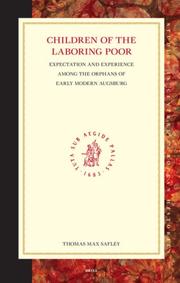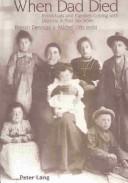| Listing 1 - 10 of 19 | << page >> |
Sort by
|
Multi
ISBN: 9781978804883 1978804881 9781978804869 1978804865 9781978804845 1978804849 9781978804852 1978804857 Year: 2021 Publisher: New Brunswick
Abstract | Keywords | Export | Availability | Bookmark
 Loading...
Loading...Choose an application
- Reference Manager
- EndNote
- RefWorks (Direct export to RefWorks)
"What is it like to grow up in an orphanage? What do residents themselves have to say about their experiences? Are there ways that orphanages can be designed to meet children's developmental needs and to provide them with necessities they are unable to receive in their home communities? In this book, detailed observations of children's daily life in a Cambodian orphanage are combined with follow-up interviews of the same children after they have grown and left the orphanage. Their thoughtful reflections show that the quality of care children receive is more important for their well-being than the site in which they receive it. Life in a Cambodian Orphanage situates orphanages within the social and political history of Cambodia, and shows that orphanages need not always be considered bleak sites of deprivation and despair. It suggests best practices for caring for vulnerable children regardless of the setting in which they are living"--
Social sciences (general) --- Orphans. --- Orphanages. --- Sociology.

ISBN: 0391042246 9780391042247 9781429426282 1429426284 9781433707803 1433707802 1280859016 9786610859016 9047403940 9789047403944 Year: 2005 Publisher: Leiden Boston Brill
Abstract | Keywords | Export | Availability | Bookmark
 Loading...
Loading...Choose an application
- Reference Manager
- EndNote
- RefWorks (Direct export to RefWorks)
A companion volume to Charity and Economy in the Orphanages of Early Modern Augsburg , this book takes up the agency and individuality of the laboring poor and their children. It examines the economic lives of poor, distressed, or truncated families on the basis of 5,734 biographical descriptions of children who passed through the City, Catholic, and Lutheran orphanages of Augsburg between 1572 and 1806. Studied in conjunction with administrative, criminal, and fiscal records of various sorts, these "Orphan Books" reveal the laboring poor as flexible and adaptive. Their fates were determined neither by the poverty they suffered nor the charity they received. Rather, they responded to changing economic and social conditions by using Augsburg's orphanages to extend their resources, care for their children, and create opportunities. The findings will interest historians of poverty, charity, labor, and the Reformation.
Orphanages --- Orphans --- Poor children --- History. --- Social conditions. --- History of Germany and Austria --- anno 1500-1799 --- Augsburg --- Orphan asylums --- Orphans and orphan-asylums --- Children --- Children of the poor --- Economically disadvantaged children --- Institutional care --- Economic conditions --- Orphaned children

ISBN: 0192545051 9780192545053 Year: 1991 Publisher: Oxford: Oxford university press,
Abstract | Keywords | Export | Availability | Bookmark
 Loading...
Loading...Choose an application
- Reference Manager
- EndNote
- RefWorks (Direct export to RefWorks)
English literature --- Orphans --- Criminals --- Dickens, Charles, --- "Oliver Twist" --- Fiction --- 5363 --- London (England) --- Oliver Twist --- --Fiction --- Orphans - Fiction --- Criminals - Fiction --- Dickens, Charles, - 1812-1870 --- Dickens, Charles, 1812-1870 --- London (England) - Fiction
Book
ISBN: 9060116348 Year: 1989 Publisher: Zutphen Walburg Pers
Abstract | Keywords | Export | Availability | Bookmark
 Loading...
Loading...Choose an application
- Reference Manager
- EndNote
- RefWorks (Direct export to RefWorks)
Sociology of social care --- History of the Netherlands --- Social organizations --- Amsterdam --- Orphanages --- -Orphans --- -#PEDA *M <492>27 --- #PEDA *M 27 --- #PEDA <091> --- Orphans and orphan-asylums --- Children --- Orphan asylums --- History --- Institutional care --- Orphans --- Geschiedenis van opvoeding en onderwijs --- History. --- handboeken en inleidingen --- handboeken en inleidingen. --- #PEDA *M <492>27 --- Orphaned children
Book
ISBN: 9014024487 Year: 1976 Publisher: Alphen
Abstract | Keywords | Export | Availability | Bookmark
 Loading...
Loading...Choose an application
- Reference Manager
- EndNote
- RefWorks (Direct export to RefWorks)
weeskinderen --- kinderen --- Social problems --- jeugdbescherming --- sociale geschiedenis --- jeugdrecht --- verwaarlozing --- Criminal law. Criminal procedure --- Social policy and particular groups --- anno 1500-1799 --- anno 1800-1899 --- Netherlands --- 343.9 --- Orphans --- -Orphans and orphan-asylums --- Children --- Criminologie --(algemeen) --- History --- History. --- -Criminologie --(algemeen) --- 343.9 Criminologie --(algemeen) --- Orphans and orphan-asylums --- Orphaned children

ISBN: 3906768236 0820456470 9783906768236 Year: 2002 Publisher: Bern: Lang,
Abstract | Keywords | Export | Availability | Bookmark
 Loading...
Loading...Choose an application
- Reference Manager
- EndNote
- RefWorks (Direct export to RefWorks)
History of Europe --- Sociology of the family. Sociology of sexuality --- anno 1700-1799 --- anno 1800-1899 --- Widowhood --- Single mothers --- Orphans --- Families --- Veuvage --- Mères de famille monoparentale --- Orphelins --- Familles --- History --- Congresses --- Histoire --- Congrès --- Family --- Mères de famille monoparentale --- Congrès --- Widowhood - Europe - History - Congresses. --- Widowhood - Asia - History - Congresses. --- Single mothers - Europe - History - Congresses. --- Single mothers - Asia - History - Congresses. --- Orphans - Europe - History - Congresses. --- Orphans - Asia - History - Congresses. --- Family - Europe - History - Congresses. --- Widowhood - Asia - History - Congresses --- Single mothers - Europe - History - Congresses --- Single mothers - Asia - History - Congresses --- Orphans - Europe - History - Congresses --- Orphans - Asia - History - Congresses --- Families - Europe - History - Congresses --- Congresses. --- DEMOGRAPHIE DE LA FAMILLE --- FAMILLES --- PARENTS ET ENFANTS --- HISTOIRE
Book
ISBN: 9780804795432 9780804796347 0804796343 0804795436 Year: 2015 Publisher: Stanford, Calif.
Abstract | Keywords | Export | Availability | Bookmark
 Loading...
Loading...Choose an application
- Reference Manager
- EndNote
- RefWorks (Direct export to RefWorks)
When World War I began, Karnig Panian was only five years old, living among his fellow Armenians in the Anatolian village of Gurin. Four years later, American aid workers found him at an orphanage in Antoura, Lebanon. He was among nearly 1,000 Armenian and 400 Kurdish children who had been abandoned by the Turkish administrators, left to survive at the orphanage without adult care. This memoir offers the extraordinary story of what he endured in those years—as his people were deported from their Armenian community, as his family died in a refugee camp in the deserts of Syria, as he survived hunger and mistreatment in the orphanage. The Antoura orphanage was another project of the Armenian genocide: its administrators, some benign and some cruel, sought to transform the children into Turks by changing their Armenian names, forcing them to speak Turkish, and erasing their history. Panian's memoir is a full-throated story of loss, resistance, and survival, but told without bitterness or sentimentality. His story shows us how even young children recognize injustice and can organize against it, how they can form a sense of identity that they will fight to maintain. He paints a painfully rich and detailed picture of the lives and agency of Armenian orphans during the darkest days of World War I. Ultimately, Karnig Panian survived the Armenian genocide and the deprivations that followed. Goodbye, Antoura assures us of how humanity, once denied, can be again reclaimed.
Panian, Karnig --- Armenian Genocide, 1915-1923 --- Orphans --- World War, 1914-1918 --- Armenian Genocide survivors --- Survivors, Armenian Genocide --- Victims --- Orphans and orphan-asylums --- Children --- Atrocities --- Banean, Gaṛnik, --- Panean, Kaṛnig, --- Panian, Kaṛnig, --- Banyan, Gaṛnik, --- Banian, Gaṛnik, --- Banean, G. --- Panyan, Karnig, --- Childhood and youth. --- Armenian massacres, 1915-1923 --- Armenian massacres survivors --- Survivors, Armenian massacres --- Armenian question --- Genocide --- Orphaned children
Book
ISBN: 9780253016850 9780253016737 9780253017659 0253017653 0253016738 0253016851 Year: 2015 Publisher: Bloomington
Abstract | Keywords | Export | Availability | Bookmark
 Loading...
Loading...Choose an application
- Reference Manager
- EndNote
- RefWorks (Direct export to RefWorks)
In these films, the orphan becomes a cinematic trope that interrogates socialist visions of ideological institutionalization and re-education and stands as a silent critic of the system's shortcomings or as a resilient spirit who has resisted capture by the political apparatus of the new state.
Orphans in motion pictures --- Abandoned children in motion pictures --- Motion pictures --- Orphelins au cinéma --- Enfants abandonnés au cinéma --- Cinéma --- History --- Histoire --- Film --- Eastern and Central Europe --- History. --- Cinema --- Feature films --- Films --- Movies --- Moving-pictures --- Audio-visual materials --- Mass media --- Performing arts --- History and criticism --- Orphans in motion pictures. --- Abandoned children in motion pictures.
Book
ISBN: 9789004282476 9789004283282 9004283285 1322309833 9781322309835 9004282475 Year: 2014 Publisher: Leiden Boston
Abstract | Keywords | Export | Availability | Bookmark
 Loading...
Loading...Choose an application
- Reference Manager
- EndNote
- RefWorks (Direct export to RefWorks)
The voices of orphans and other vulnerable children and young people and of their carers and professional development workers are documented and analysed to both criticise the inadequacies of current social development work and to create a new, alternative theory and practice of project management in Zimbabwe and southern Africa. This is the first extensive and intensive empirical study of Zimbabwean orphans and other vulnerable children and young people. Chronically poor children and their carers can be corrupted or silenced by management systems which fail to recognise their basic human needs. Resilience in the face of such adversity is celebrated by the dominant project management ideology and practice but is a major barrier to achieve genuine sustainable improvements in the lives of vulnerable children. We propose a new person-centred project management approach aimed at delivering comprehensive services for orphans, which explicitly recognises the needs of orphans and other poor children to be fully socially, politically and economically included within their communities and which avoids the reinforcement of power based inequalities and their unacceptable consequences. The moral bankruptcy of much social development work in Zimbabwe and elsewhere in Southern Africa is described and we delineate an alternative project management policy and practice.
Age group sociology --- Social policy and particular groups --- Zimbabwe --- Orphans --- Children --- Social planning --- Project management --- Industrial project management --- Management --- Social development planning --- Planning --- Childhood --- Kids (Children) --- Pedology (Child study) --- Youngsters --- Age groups --- Families --- Life cycle, Human --- Orphans and orphan-asylums --- Social conditions. --- Services for --- Africa, Southern --- Social policy. --- Southern Africa --- Orphaned children

ISBN: 9065505539 Year: 1997 Publisher: Hilversum : Verloren,
Abstract | Keywords | Export | Availability | Bookmark
 Loading...
Loading...Choose an application
- Reference Manager
- EndNote
- RefWorks (Direct export to RefWorks)
weeskinderen --- History of the Netherlands --- sociale geschiedenis --- Social policy and particular groups --- Child welfare --- -Children --- -Orphanages --- -Orphans --- -Poor children --- -Children of the poor --- Economically disadvantaged children --- Poor children --- Children --- Orphans and orphan-asylums --- Orphan asylums --- Childhood --- Kids (Children) --- Pedology (Child study) --- Youngsters --- Age groups --- Families --- Life cycle, Human --- Child protective services --- Child protective services personnel --- CPS (Child protective services) --- Humane societies --- Protection of children --- Family policy --- Public welfare --- Social work with children --- Social work with youth --- History --- Institutional care --- -History --- Services for --- Economic conditions --- Charities --- Charities, protection, etc. --- Protection --- Orphanages --- Orphans --- History. --- Children of the poor --- Institutional care&delete& --- Services for&delete& --- Care --- Netherlands --- Orphaned children
| Listing 1 - 10 of 19 | << page >> |
Sort by
|

 Search
Search Feedback
Feedback About UniCat
About UniCat  Help
Help News
News